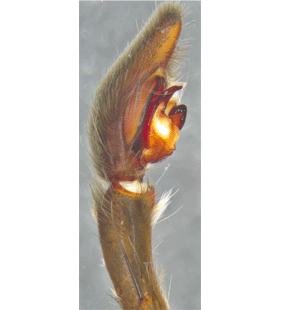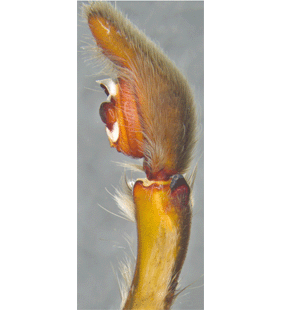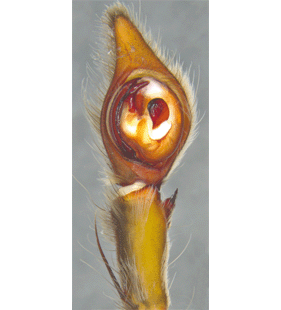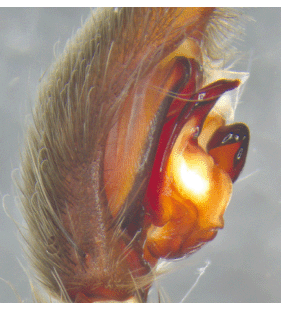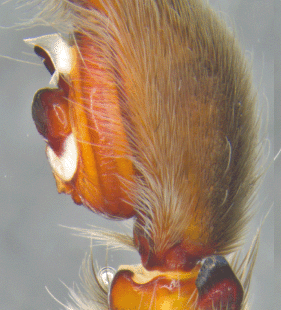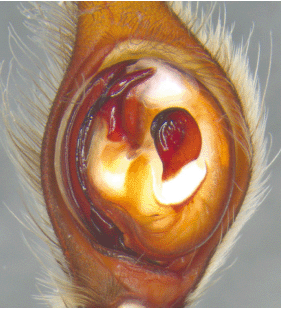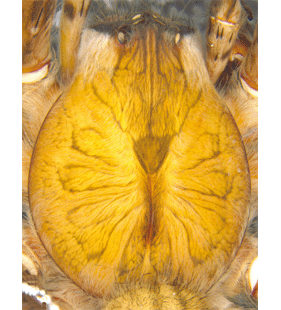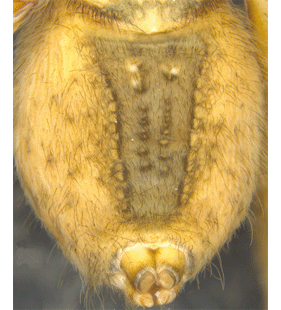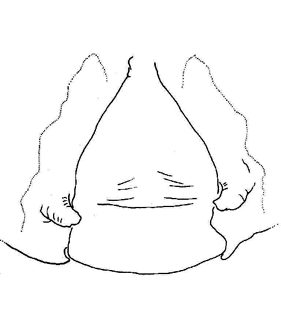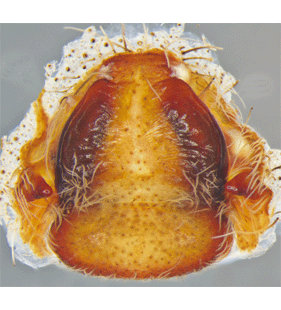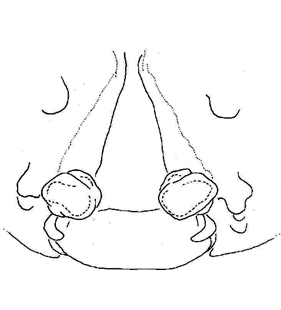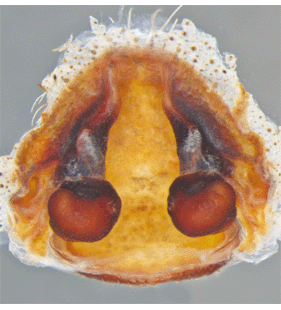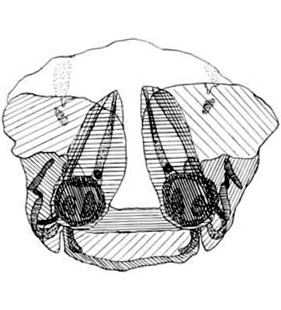Phoneutria boliviensis (F. O. Pickard-Cambridge, 1897)
Beschreibung
Männchen
Färbung sehr variabel: Prosoma, Beine und Sternum dunkel rotbraun, Opisthosoma braun.
Körperlänge Männchen: 30-35 mmWeibchen
Weibchen: Körper sehr variabel über gelb, gelbbraun bis graubraun. Prosoma gelblich bis rötlich braun mit dünnem schwarzem Längsstreifen, schwarze Linien seitlich neben dem Augenfeld und dorsal auf den Pedipalpen, oft gelblich abgesetzt. Opisthosoma dorsal gelblich mit paarweise angeordneten hellen, gelblich-bräunlichen Winkelflecken, ventral gold-gelb mit 2 Reihen brauner Flecken und 2 weißen Flecken. Cheliceren rötlich bis rotbraun gefärbt, Beine dorsal oft mit kleinen gelblichen Flecken und schmalen schwarzen Querstreifen.
Körperlänge Weibchen: 30-40 mmZusätzliche Informationen
Nicht etablierte Art in Europa (Nentwig, 2015).
Diese Art stammt aus Mittel- und Südamerika und ist daher nicht-einheimisch für Europa. Sie wird selten nach Europa eingeschleppt, meistens mit Bananen, konnte sich aber nicht etablieren. Diese Spinnen kann Menschen beißen. Die nachfolgenden Informationen stammen von der nah verwandten Art P. nigriventer (Bucaretchi et al., 2000), da zu P. boliviensis kaum Informationen vorliegen. Die Spinne kann auf einen sich nähernden Menschen etwa 30 cm zuspringen, um dann zu beißen. Gemäß einer großen brasilianischen Studie erfolgen Bisse in der Regel in Hände und Füße. In seltenen Fällen wird kein Gift injiziert (trockener Biss) und die Einstichstelle ist nur in 13 % aller Fälle sichtbar. Die meisten Bisse führen nur zu einer milden Vergiftung, mit lokalem stechenden Schmerz und einer geringfügigen Schwellung, die nach wenigen Stunden abklingen. In seltenen Fällen werden systemische Effekte wie Schweißausbrüche und beschleunigter Puls beobachtet. In lediglich 1 % der Fälle wurde starker Schmerz beobachtet, gefolgt von Schweißausbrüchen, Zittern und Erbrechen. Solch schwere Fälle betreffen nur Kinder. Todesfälle sind für P. boliviensis bisher noch nicht berichtet worden.
Verbreitung
Abbildungen
Verbreitungsnachweise
"No reference" bedeutet nicht, dass die Art in diesem Land nicht vorkommt, sondern dass wir die Referenz hierfür noch nicht eingefügt haben. Wir arbeiten daran.
Literatur
Bosmans R, Van Keer K (2017) Een herziene soortenlijst van de Belgische spinnen (Araneae). Nieuwsbrief van de Belgische Arachnologische Vereniging 32: 39-69 ![]()
Bucaretchi F, Deus Reinaldo C R, Hyslop S, Madureira P R, De Capitani E M, Vieira R J (2000) A clinico-epidemiological study of bites by spiders of the genus Phoneutria. Revista do Instituto de Medicina Tropical de São Paulo 42: 17-21 ![]()
Essl F, Rabitsch W (2002) Neobiota in Österreich. Umweltbundesamt, Wien, 432 pp. ![]()
Hazzi N A, Hormiga G (2021) Morphological and molecular evidence support the taxonomic separation of the medically important Neotropical spiders Phoneutria depilata (Strand, 1909) and P. boliviensis (F.O. Pickard-Cambridge, 1897) (Araneae, Ctenidae). ZooKeys 1022: 13-50 ![]()
Jäger P, Blick T (2009) Zur Identifikation einer nach Deutschland eingeschleppten Kammspinnenart (Araneae: Ctenidae: Phoneutria boliviensis). Arachnologische Mitteilungen 38: 33-36 ![]()
Nentwig W (2015) Introduction, establishment rate, pathways and impact of spiders alien to Europe. Biological Invasions 17: 2757-2778 ![]()
Noordijk J (2019) In Nederland geïmporteerde 'Braziliaanse zwerfspinnen' (Araneae: Ctenidae: Phoneutria) [Imported 'Brazilian wandering spiders' in the Netherlands]. Entomologische Berichten 79: 202-207 ![]()
Schmidt G (1954) Zur Herkunftsbestimmung von Bananenimporten nach dem Besatz an Spinnen. Zeitschrift für Angewandte Zoologie 36: 400-422 ![]()
Simó M, Brescovit A D (2001) Revision and cladistic analysis of the Neotropical spider genus Phoneutria Perty, 1833 (Araneae, Ctenidae), with notes on related Ctenidae. Bulletin of the British Arachnological Society 12: 67-82 ![]()
WSC (2025) World Spider Catalog. Version 26. Natural History Museum Bern, online at http://wsc.nmbe.ch (28.2.2025) doi: 10.24436/2 ![]()
Updates
| 17-11-2023 | Image insert | |
| 16-10-2023 | Distribution update | Detail |
| 16-10-2023 | Distribution insert | Detail |
| 01-03-2023 | Distribution insert | Detail |
| 11-03-2021 | Image insert | |
| 11-03-2021 | Distribution update | Detail |
| 23-01-2020 | Distribution update | Detail |
| 21-09-2019 | Datasheet update | Detail |
| 09-01-2019 | Distribution update | Detail |
| 09-01-2019 | Image insert | |
| 16-08-2017 | Distribution update | Detail |
| 16-08-2017 | Image insert | |
| 04-04-2017 | Image insert | |
| 04-04-2017 | Distribution update | Detail |
